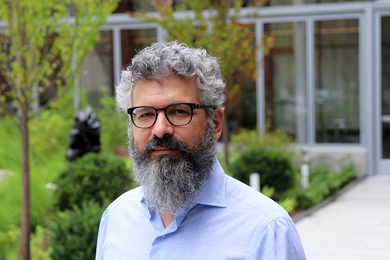Two MIT researchers — Mriganka Sur and Li-Huei Tsai — have been named among the 65 new members of the Institute of Medicine (IOM).
Sur, the Paul E. Newton Professor of Neuroscience and head of the Department of Brain and Cognitive Sciences (BCS), and Tsai, the Picower Professor of Neuroscience in BCS and director of the Picower Institute for Learning and Memory, join the 29 current MIT faculty and three current staff members who are IOM members.
Sur — also a member of the Picower Institute — researches cortical development and plasticity. The goal is to understand long-term plasticity and short-term dynamics in networks of the developing and adult visual cortex. A related goal is to discover mechanisms underlying disorders of brain development.
Tsai, who is also a Howard Hughes Medical Institute investigator, examines the pathological mechanisms underlying neurological disorders affecting learning and memory. Her major research areas include neuropsychiatric disorders, autism and Alzheimer’s disease.
"It is a great pleasure to welcome these distinguished and accomplished individuals to the Institute of Medicine," said IOM President Harvey V. Fineberg. "Each of these new members stands out as a professional whose research, knowledge, and skills have significantly advanced health and medicine, and their achievements are an inspiration. The Institute of Medicine is greatly enriched by the addition of our newly elected colleagues."
The Institute of Medicine is one of the four national academies, along with the National Academy of Sciences, the National Academy of Engineering and the National Research Council. It serves as a national resource for independent, scientifically informed analysis and recommendations on human health issues.
Election to the IOM is considered one of the highest honors in the fields of health and medicine and recognizes individuals who have demonstrated outstanding professional achievement and commitment to service. A diversity of talent among IOM's membership is assured by the Institute's charter, which stipulates that at least one-quarter of the membership is selected from outside the health professions, for example, from such fields as the natural, social, and behavioral sciences; law; engineering; and the humanities. The newly elected members raise IOM's total active membership to 1,688 and the number of foreign associates to 102. With an additional 80 members holding emeritus status, IOM's total membership is 1,870.
Sur, the Paul E. Newton Professor of Neuroscience and head of the Department of Brain and Cognitive Sciences (BCS), and Tsai, the Picower Professor of Neuroscience in BCS and director of the Picower Institute for Learning and Memory, join the 29 current MIT faculty and three current staff members who are IOM members.
Sur — also a member of the Picower Institute — researches cortical development and plasticity. The goal is to understand long-term plasticity and short-term dynamics in networks of the developing and adult visual cortex. A related goal is to discover mechanisms underlying disorders of brain development.
Tsai, who is also a Howard Hughes Medical Institute investigator, examines the pathological mechanisms underlying neurological disorders affecting learning and memory. Her major research areas include neuropsychiatric disorders, autism and Alzheimer’s disease.
"It is a great pleasure to welcome these distinguished and accomplished individuals to the Institute of Medicine," said IOM President Harvey V. Fineberg. "Each of these new members stands out as a professional whose research, knowledge, and skills have significantly advanced health and medicine, and their achievements are an inspiration. The Institute of Medicine is greatly enriched by the addition of our newly elected colleagues."
The Institute of Medicine is one of the four national academies, along with the National Academy of Sciences, the National Academy of Engineering and the National Research Council. It serves as a national resource for independent, scientifically informed analysis and recommendations on human health issues.
Election to the IOM is considered one of the highest honors in the fields of health and medicine and recognizes individuals who have demonstrated outstanding professional achievement and commitment to service. A diversity of talent among IOM's membership is assured by the Institute's charter, which stipulates that at least one-quarter of the membership is selected from outside the health professions, for example, from such fields as the natural, social, and behavioral sciences; law; engineering; and the humanities. The newly elected members raise IOM's total active membership to 1,688 and the number of foreign associates to 102. With an additional 80 members holding emeritus status, IOM's total membership is 1,870.





